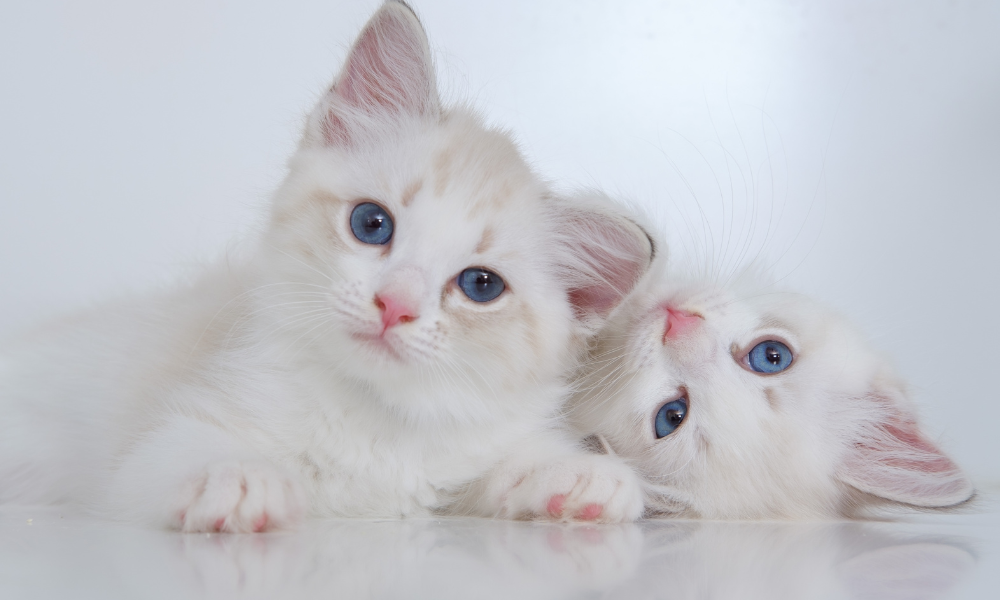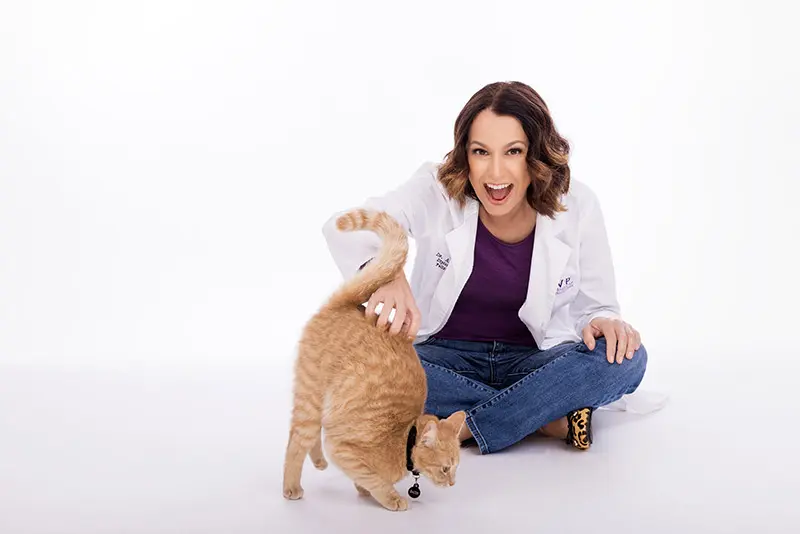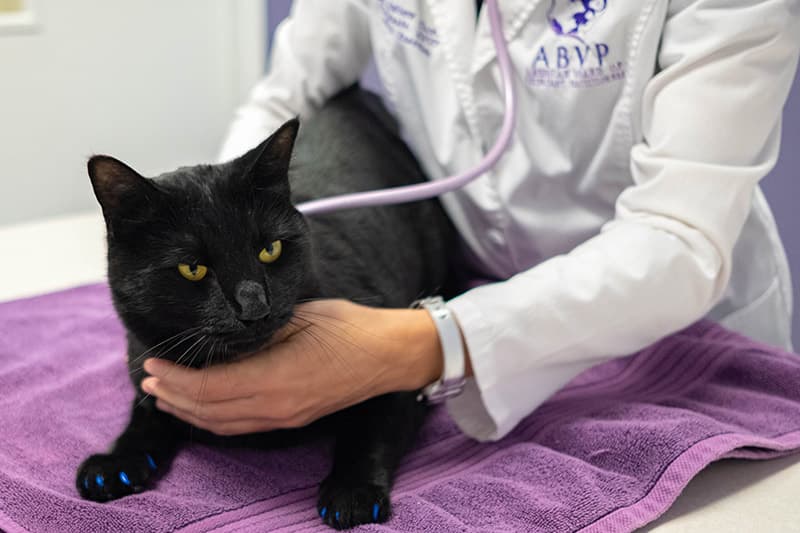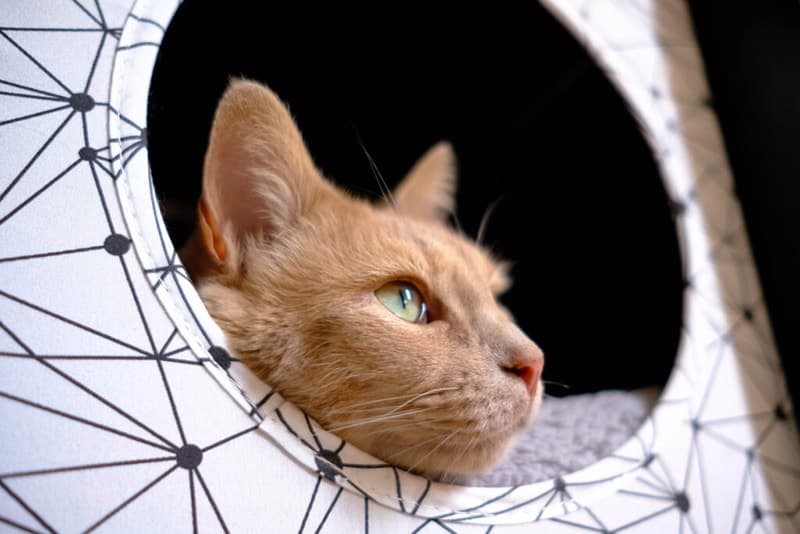It’s no secret that people have very strong opinions about vaccines for themselves (especially lately). But what about vaccines for kittens? As a board-certified feline veterinarian, I have this discussion with people all the time!
Let’s break down the core vaccines for kittens in an easy-to-understand way. What do they need and why?
First, what’s a “core” vaccine? A core vaccine is one that is recommended for all individuals in a certain group (i.e. kittens versus adults).
A non-core vaccine is recommended only for specific individuals based on their age, lifestyle or geographic location. For example, a 3-year-old outdoor cat has different vaccine needs than a 3-year-old cat living on the 10th floor of a high-rise.
The American Association of Feline Practitioners (AAFP) is a veterinary association whose mission is to support “its members in improving the health and wellbeing of cats through high standards of practice, continuing education, and evidence-based medicine.”
The AAFP is the veterinary authority on cat-focused recommendations.
Their most recent 2020 Feline Vaccination Guidelines (co-written with the American Animal Hospital Association) discusses everything from types of vaccines (and how they work) to core and non-core vaccines for both pet and shelter kittens and adult cats.
If you want to read a professionally written, thorough 18-page document, here it is!
If that’s too much for you, you’ve come to the right place. Let’s summarize vaccines for kittens and what they need!
Oh, by they way. These vaccines are administered subcutaneously (i.e. under the skin), not into the muscle like when we get a vaccine. In my feline-practice we like to distract the kittens with a tasty treat of chicken baby food or Churu. They usually don’t feel a thing!
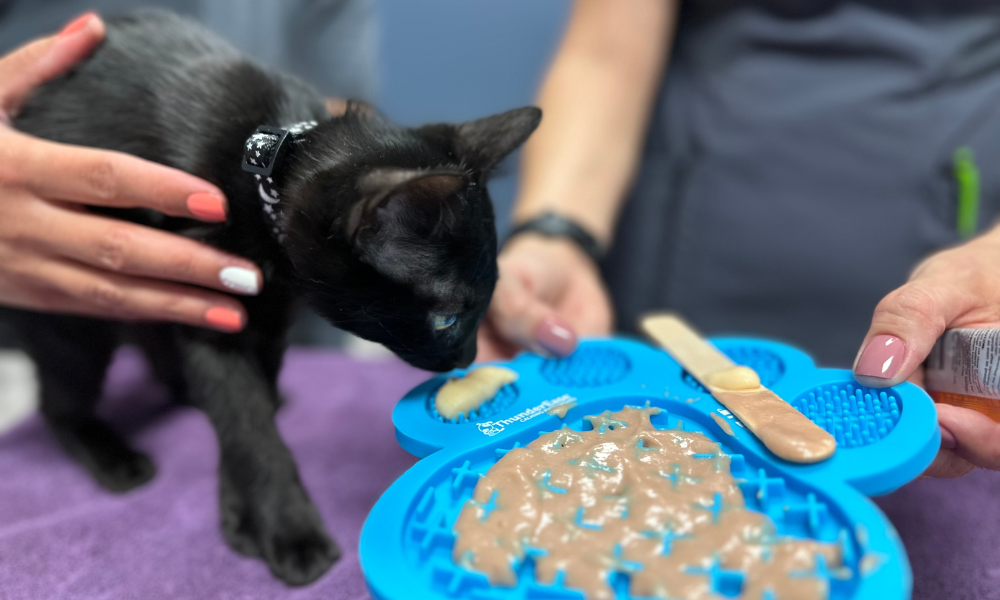
The Core Vaccines For Kittens: FVRCP, FeLV and RV
Let’s start with the first one…
The FVRCP Vaccine For Kittens
This vaccine actually protects against 3 different diseases:
- FVR = feline viral rhinotracheitis (i.e. an upper respiratory infection), also known as FHV-1 (feline herpes virus).
- C = calicivirus (an upper respiratory infection that can cause painful ulcers in the mouth and has been associated with another painful condition called stomatitis), also known as FCV.
- P = panleukopenia (a gastrointestinal virus that causes low blood cells), also known as FPV. This disease is like the feline version of the parvovirus, a serious dog disease.
Wow, that’s a lot of letters to remember. So…
This vaccine is often called “Distemper” because that is another name for panleukopenia. If you say parvo then the dog disease is implied, but sometimes people do say “feline parvo.”
This vaccine is given no earlier than 6 weeks of age and then every 3–4 weeks until 16–20 weeks of age.
Why so many?
It has to do with the queen’s immunity (i.e. mommy cat) and when it wears off. It’s not an exact date, but we know that kittens may still have antibodies from their mommy cat’s immunity until 16-20 weeks old (and sometimes longer!).
In fact, interference by maternal antibodies is a main cause of a vaccine to fail. This is rare, but it can occur. Hence the reason why we give the vaccine “boosters.”
So it’s not so much about “how many” they get but more about at what age they finish the vaccine series. If a kitten is fortunate enough to start the series early (mom’s immunity may OR may not be already wearing off), then they need to keep going until that 16-20-week-old mark.
If they don’t start until later, they still need to meet that age requirement.
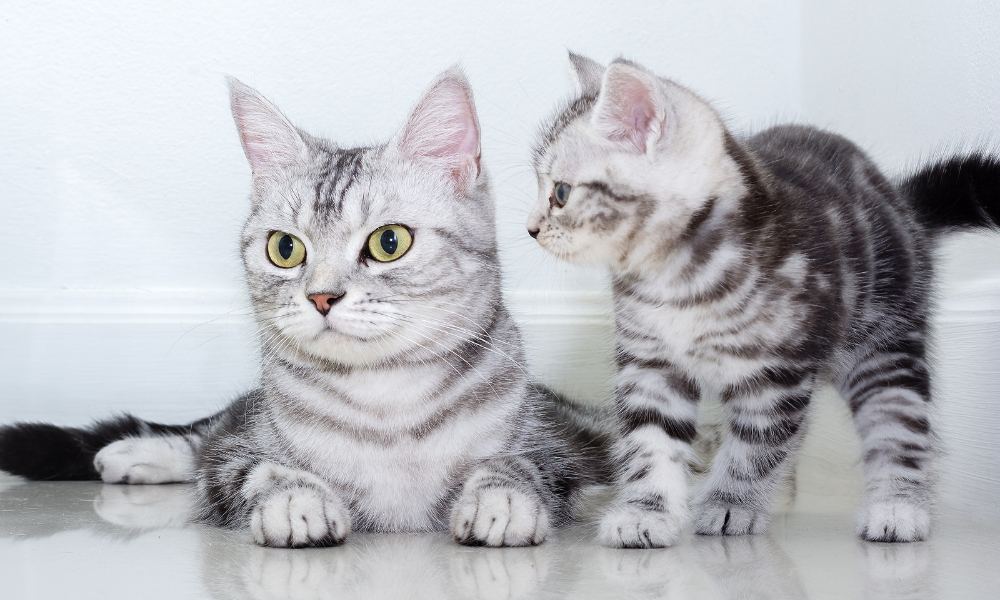
Is FVRCP really an important vaccine for kittens?
Oh yeah! Good grief, the number of upper respiratory cats we see in daily practice is crazy! Now, this vaccine provides what is called non-sterilizing immunity which means that they can still get the disease but at a less severe level.
And calicivirus? Having ulcers in a cat’s mouth can be excruciating. As a former cancer patient, I know this for a fact.
And guess what? We can only treat their symptoms. Ugh. There’s no magic pill. So how about we vaccinate in an attempt to lessen the chances of serious disease?
The final part of the vaccine is panleukopenia (“pan-loo-ko-pee-nee-uh”). This one can kill your cat, plain and simple. Kittens are the most susceptible but in theory, any cat can get it. I once treated a young cat father and his kitten son. Heartbreaking!
But my kitten is indoors only!
Ah, but there are still many ways for your kitten (and later on, your adult cat) to become exposed. These viruses are easily transmitted on clothes and other objects.
And don’t forget about coming to the vet. I tell people that, despite our strict sanitation procedures, sometimes it’s like a kid going to daycare. Viruses are everywhere!
Yes, the FVRCP vaccine is important as a kitten and throughout life. As they get older the frequency of vaccination decreases. Talk to your vet.
The FeLV Vaccine For Kittens – Feline Leukemia Virus.
No, this is not leukemia like we think of in people (i.e. a cancer of the blood), although cats can get that too. However, cats with FeLV are also more susceptible to certain types of cancer.
The feline leukemia virus causes a wide variety of conditions. Everything from lowered immune systems, fevers, cancers, oral diseases and more.
Yep, it’s a serious virus! It’s transmitted either from the mom to the kitten (before or after birth) or from contact with various bodily secretions from an infected cat (such as mutual grooming or a bite wound).
This vaccine is given as two doses 3–4 weeks apart beginning as early as 8 weeks of age, depending on the type of vaccine.
So, is the feline leukemia vaccine important for kittens?
Yes. Once again, it can be deadly! Kittens are tested prior to starting the vaccine series. Nowadays we have very advanced tests that can also be performed on positive cats to know more about their status.
A “diagnosis” of FeLV can mean many things (like is it a really active infection, or not) and the prognosis depends on the results of additional testing.
Why does my indoor kitten need it?
Because kittens are little troublemakers and the leukemia virus can be deadly. Many people plan to keep their kittens inside, but all it takes is a door left open and out they go.
After they become an adult and prove they are not escape artists, then it becomes a non-core vaccine. Remember, that means they no longer need it unless they are going to be outside (and could contact another cat) or around an FeLV-positive cat.
Talk to your veterinarian about your adult cat’s risk, or lack thereof.
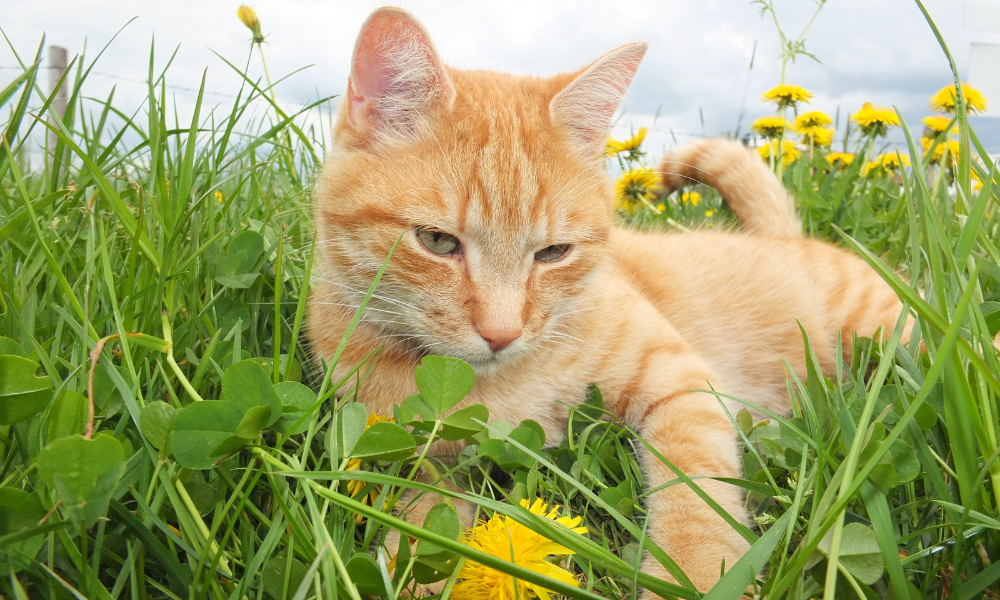
The Rabies Vaccine For Kittens (*Depending on your local laws*)
Ok, so if you live in Hawaii where they don’t have Rabies, hooray!
If Rabies exists in your area, keep reading.
Here’s where I should be able to just say “it’s deadly and there’s no treatment” and everyone would believe me and be done with it. Instead, here we go…
Rabies is a virus. Yep, it’s deadly. Yep, your indoor cat can become exposed.
What?!?
Ask me how many crazy stories I’ve heard about cats (and dogs too) becoming exposed…
- You wake up to find a dead bat on the floor. Did it bite anyone? Bat bites are tiny and are hard to identify.
- Did your innocent, fluffy Persian princess play with it (even feline princesses are still carnivores)?
- Oh, what about my client who walked into her kitchen and found a racoon just hangin’ out. As they say, “stuff” happens.
I LOVE this article written by none other than Elizabeth the cat from the Cornell Feline Health Center. In it Elizabeth discusses the reasons why an indoor cat would benefit from a Rabies vaccine.
The Rabies vaccine is administered according to vaccine label instructions and local laws.
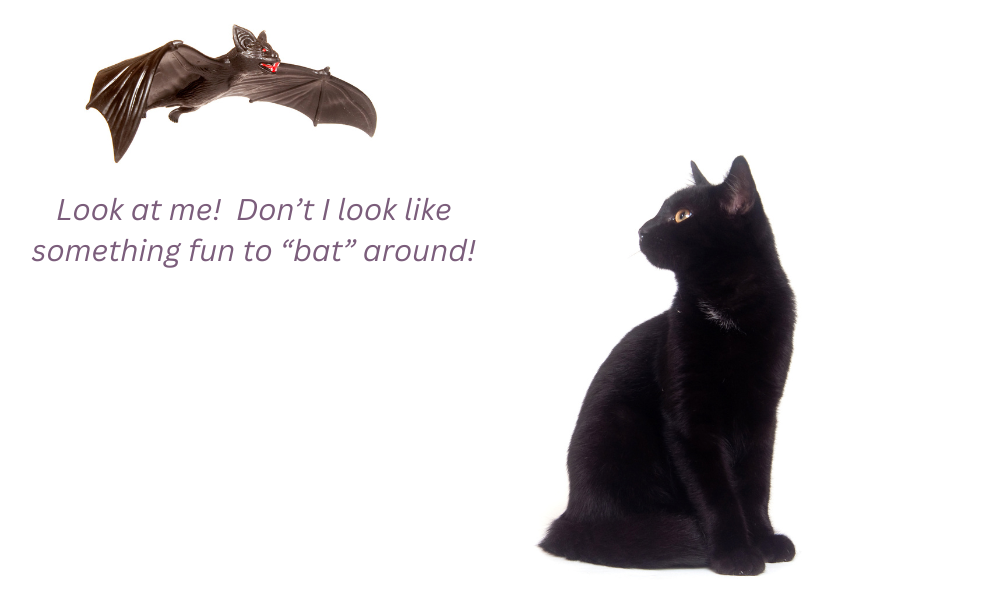
Can we test for Rabies?
Ooh, you just had to ask me that… If you are squeamish or easily offended then you may want to skip to the end because the answer is not pretty.
Testing for Rabies involves euthanizing the animal, cutting off their head and submitting it to a laboratory for testing to look for the virus in their brain.
See, I told you. It’s a terrible task that I’ve only had to do once and I never want to do it again.
The Rabies vaccine. It’s important.
Any other injections that my kitten needs?
Let’s move onto something happier! Microchipping! It’s not a vaccine, but it’s still an injection that is often administered as a kitten.
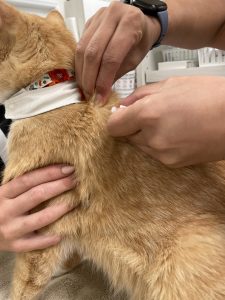 I recommend microchipping for all kittens and cats. All it takes is a door left open or a carrier that breaks in the parking lot of the vet (ask me how I know) and your cat is gone.
I recommend microchipping for all kittens and cats. All it takes is a door left open or a carrier that breaks in the parking lot of the vet (ask me how I know) and your cat is gone.
Microchips have allowed thousands of pets to be reunited with their owners. All shelters scan all “found” animals.
Microchipping is often performed at the time of the spay or neuter surgery but can actually be administered anytime. A needle containing a very small microchip is inserted under the skin and the microchip is injected. This is quick and with minimal discomfort.
The chip must be registered to the owner’s name. Some states and even cities (Hawaii, Houston) have specific microchip requirements. Check your local laws.
What about non-core vaccines for kittens?
Finally, there are a few other vaccines that exist such as Bordetella and Chlamydia that are considered non-core. Both are bacterial infections that cause upper respiratory disease.
It would be rare for a veterinarian to recommend these vaccines. A cattery with an outbreak would be one example where it might be considered. You likely don’t need to worry about these.
That’s it! There are only three vaccines for kittens that are regularly recommended!
In summary, kittens should be vaccinated for FVRCP, FeLV and (likely) Rabies aka “Distemper, Leukemia and Rabies.” Every year their lifestyle and risk factors should be reassessed to determine their current wellness needs. Talk to your veterinarian to learn more about vaccines for kittens!
